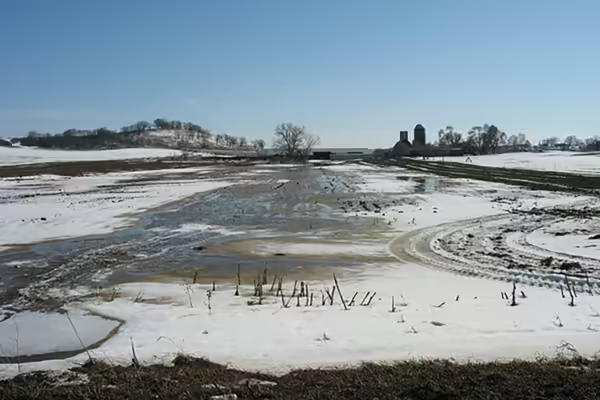
URBANA, Ill. — Nutrient runoff from agricultural production is a significant source of water pollution in the U.S., and climate change that produces extreme weather events is likely to exacerbate the problem. A new study from the University of Illinois Urbana-Champaign looks at how extreme rainfall impacts runoff and suggests possible mitigation strategies.
“We look at more than a decade of precipitation events in the state of Wisconsin and quantify the increase in nutrient runoff right around the event and at the end of the growing season. Climate models predict that we’ll continue to see an increase in extreme events, and our works speaks to the challenging relationship between nutrient use and water quality,” said Marin Skidmore, assistant professor in the Department of Agricultural and Consumer Economics, part of the College of Agricultural, Consumer and Environmental Sciences (ACES) at U. of I. Skidmore is lead author of the study with coauthors Jeremy Foltz from University of Wisconsin-Madison and Tihitina Andarge from the University of Massachusetts-Amherst.
“Our focus on a single state allows us to accurately measure farm locations and practices, while keeping statewide regulation constant, in a way that would be difficult in a national study,” Skidmore added.
Livestock manure and crop fertilizer are major causes of nonpoint source pollution from agriculture. Wisconsin has a large dairy industry, where most farms are below the federal definition of concentrated animal feeding operations (CAFOs) and therefore not regulated under the Clean Water Act. Instead, they are subject to a patchwork of local regulations.
Read the full release from the College of ACES.
Photo caption: Thawing caused by warm winter weather increases manure runoff from fields, leading to higher phosphorus content in Wisconsin lakes. Photo courtesy of Herb Garn, USGS.
Illinois Extension leads public outreach for University of Illinois by translating research into action plans that allow Illinois families, businesses, and community leaders to solve problems, make informed decisions, and adapt to changes and opportunities. Illinois Extension is part of the University of Illinois Urbana-Champaign College of Agricultural, Consumer and Environmental Sciences.